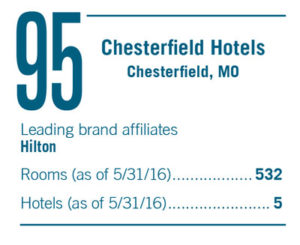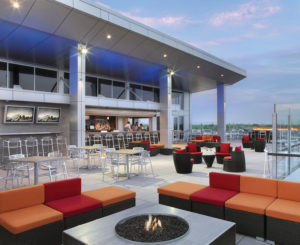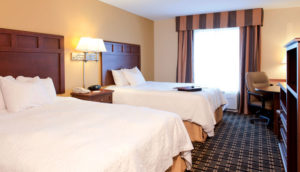 CHESTERFIELD, MO—On Oct. 30, 2008, five days before the presidential election, then-Senator Barack Obama gave a speech at the University of Missouri in Columbia. The future president stayed in a Hampton Inn & Suites, taking over the fourth floor while the press corps stayed on the third. That’s also the day the Hampton’s owner, Chesterfield Hotels Inc.’s David Parmley, decided to build a full-service hotel.
CHESTERFIELD, MO—On Oct. 30, 2008, five days before the presidential election, then-Senator Barack Obama gave a speech at the University of Missouri in Columbia. The future president stayed in a Hampton Inn & Suites, taking over the fourth floor while the press corps stayed on the third. That’s also the day the Hampton’s owner, Chesterfield Hotels Inc.’s David Parmley, decided to build a full-service hotel.
“It dawned on me at that point,” he said, noting that although the Hampton Inn & Suites was a quality hotel, it wasn’t the typical property for this kind of visit. “We’re getting the future President of the United States coming here, so that was the impetus for The Broadway–A DoubleTree by Hilton, which is a boutique property.”
Parmley was inspired by DoubleTree’s theWit hotel in Chicago. “I didn’t know you could do a boutique DoubleTree until I stayed there,” he explained. The property opened in 2014—winning DoubleTree’s Deal of the Year award—but Parmley noted that it took so long to build because of problems with the recession. “We started in 2011 and the banks loved the project, but no banks had any money left,” he explained. “I had 10 banks who wanted to give me $1-2 million, but I didn’t want to cobble it together. Finally, I found a banker who wasn’t overextended.”
Now, the property is once again at the forefront for Chesterfield Hotels. “We’re always looking for new opportunities, but right now we’re working on building phase two to the Broadway hotel,” said Parmley. This will consist of another eight-story tower directly north of the existing building. The company plans for 81 new guestrooms, adding to the existing 114 rooms.

The new tower at The Broadway–A DoubleTree by Hilton will offer meeting space to complement the existing rooftop bar.
More importantly, said Parmley, will be the addition of more meeting space. “When we did that hotel we were very limited on space,” he explained. “We only had a half an acre when we built the original one so we had to get a waiver from Hilton on our meeting room requirements. Usually they want 5,000 sq. ft., minimum. We were only able to get about 3,000 sq. ft. so we’re going to add a large ballroom on the top floor overlooking downtown Columbia.” And, with additional meeting space on the ground floor, the DoubleTree will have some 9,000 sq. ft. of meeting space. “Right now, we only seat about 150 people max and there are a lot of weddings that are 200-plus. With the ballroom, we’ll be able to do a wedding for 300-plus, and after, we’ll have a connection across the alley via a 20-ft. skywalk that will take you straight over to the rooftop bar so you can continue on with the party once the old folks go home,” said Parmley. “We’re working the plans now and we’ll probably be submitting to the city in the next two to three months, and hope to start construction next spring or summer.”
The DoubleTree was a bit of a departure for Chesterfield Hotels—the rest of its hotel portfolio is comprised of four Hampton properties: a Hampton Inn & Suites and Hampton Inn in Chesterfield; the property in Columbia; and another Hampton Inn & Suites in Steamboat Springs, CO. Parmley had originally built his first property in Chesterfield, an upscale suburb of St. Louis, because he felt the area lacked limited-service brands.
Parmley outlined the company’s growth strategy. “First off, we take a significant if not majority stake in all of our hotels; if it’s worth doing, I should be all in,” he said, noting many companies will grow quickly via management contracts. While he’s not opposed to that if the right opportunity came along, it’s not a priority for Chesterfield.
With the exception of the Colorado property, all of the hotels have been initial developments. “The advantage of building ground up is when a pipe gets clogged or an electrical outlet isn’t working, having been here during construction, you know the bones and history of the building, which is very helpful,” he said.
“With site selection, I’ve always been very particular. I want to get someplace that’s high barriers to entry; it’s usually more difficult and costly to build there, but once you got something, you’ve got something,” continued Parmley. “There’s no advantage to being on an interstate when there’s four corners on an intersection and every corner has a hotel.” He added that being in a college town such as Columbia, which has Columbia College and Stephens College in addition to Mizzou, is extremely beneficial.
“I opened the Hampton Inn & Suites there in August 2008,” he said, noting that the recession could have made things difficult. “But it really proves how good it is to be in university towns, because despite that, the first full year we still ran 67%, which is not bad coming out of the blocks in a recession… I like to say the university doesn’t book rooms monolithically. It’s like being across from a giant corporate business park where you’ve got 800 operations over there. Each business or department—biology, anthropology, sports—they all do their own bookings. You’ve got constant events coming from different places.”
And the future, in spite of potential challenges such as wage increases, is very good, according to Parmley. “Most of our hotels are setting new records—the best months they’ve ever had,” he said, noting that the Colorado property ran 94% occupancy in July, its highest ever in history. “We are starting to see more development in the marketplace. That’s very cyclical. Hopefully, the bankers will be more cautious this time and not give loans to everybody who comes around with a hotel idea, and try to focus on experienced developers.”
While the industry is cyclical and Parmley noted that it would probably be a good time to sell right now—it’s unlikely he’ll divest assets. “I’m not saying if the right offer came around,” he said, acknowledging that Chesterfield has only ever built or acquired but never sold. “We are in it for the long haul and that goes back to having a large ownership stake. As long as they’re producing properties, I’ll probably keep them.”
This year marks the 20th anniversary for Chesterfield Hotels, and Parmley would like to see steady growth for the next 20. He noted that the company’s model has always been to use profits from existing hotels to develop subsequent ones—which can take a bit longer when you invest in the majority of the property. “I don’t want to grow to 20 or 30 hotels, but if we could double it and have 10 or 15 in the next 20 years, that would be great,” he concluded. HB


